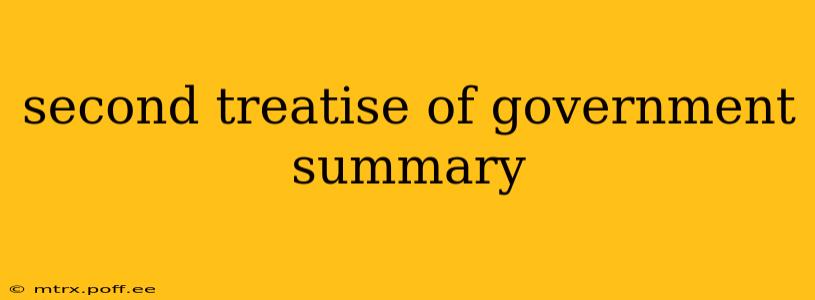John Locke's Second Treatise of Government, published anonymously in 1689, is a cornerstone of liberal political philosophy. It profoundly influenced the American and French Revolutions, shaping modern conceptions of individual rights, limited government, and the social contract. This summary will explore its key arguments, focusing on the state of nature, natural rights, the social contract, and the right to revolution.
The State of Nature: A Foundation of Freedom
Locke begins by envisioning a "state of nature" preceding government. This isn't a chaotic war of all against all, as Hobbes argued, but rather a state governed by natural law. Natural law dictates that all individuals possess inherent rights, primarily the right to life, liberty, and property. Crucially, this state of nature isn't lawless; it's governed by reason and the understanding that everyone is equal and independent. Disputes are resolved through a natural system of justice, albeit one potentially prone to bias and inconsistency.
What is the main argument of Locke's Second Treatise?
Locke's main argument revolves around the justification of limited government based on the consent of the governed. He argues that individuals willingly surrender certain rights to form a government that protects their remaining natural rights – primarily life, liberty, and property. This government, however, is limited in its power and accountable to the people. If the government violates the social contract by infringing on these fundamental rights, the people have the right to alter or abolish it.
Natural Rights: Inherent and Inalienable
The concept of natural rights is central to Locke's philosophy. He argues that these rights are inherent and inalienable – meaning they exist prior to government and cannot be legitimately taken away. The right to life is self-explanatory; the right to liberty encompasses freedom from arbitrary control and the right to pursue one's own interests. The right to property is particularly significant; Locke argues that individuals acquire property through their labor, mixing their work with natural resources. This right to property is a fundamental building block of his political theory.
What are Locke's three natural rights?
Locke's three primary natural rights are life, liberty, and property. He emphasizes that these rights are inherent and precede the formation of government, serving as the basis for legitimate political authority. The protection of these rights is the primary purpose of government.
The Social Contract: Consent and Limited Government
To address the potential shortcomings of the state of nature, individuals enter into a social contract. This contract involves agreeing to form a government that will protect their natural rights more effectively than they could individually. However, it's a contract of limited government; individuals don't surrender all their rights. They retain the right to life, liberty, and property, and the government's power is restricted to protecting these rights. This limitation is a crucial aspect distinguishing Locke's theory from others that advocate for absolute sovereignty.
What is the significance of the social contract in Locke's theory?
The social contract in Locke’s theory is paramount. It signifies the voluntary agreement by individuals to form a government for the protection of their natural rights. This agreement is not a blank check; it's conditional on the government fulfilling its role of safeguarding those rights. The violation of this contract justifies rebellion.
The Right to Revolution: A Check on Tyranny
Locke argues that the social contract isn't merely an agreement; it’s an ongoing relationship contingent upon the government upholding its end of the bargain. If the government consistently fails to protect natural rights, or actively violates them, the people have a right to revolt and establish a new government. This right to revolution is a crucial safeguard against tyranny and ensures that government remains accountable to the people. This is not a call for frequent rebellion but a recognition that ultimate sovereignty resides with the people.
How does Locke justify the right to revolution?
Locke justifies the right to revolution as a necessary consequence of the social contract. If the government breaches the contract by systematically violating the natural rights of its citizens, the people are released from their obligation to obey and have the right to establish a new government that will better protect their rights. This act is justified not as a desire for chaos, but as a restoration of the social contract's fundamental purpose.
In conclusion, Locke's Second Treatise of Government remains highly influential because of its emphasis on individual rights, limited government, and the right to revolution. It provides a powerful argument for a political system based on the consent of the governed and the protection of fundamental liberties. These ideas continue to shape political thought and practice globally.
